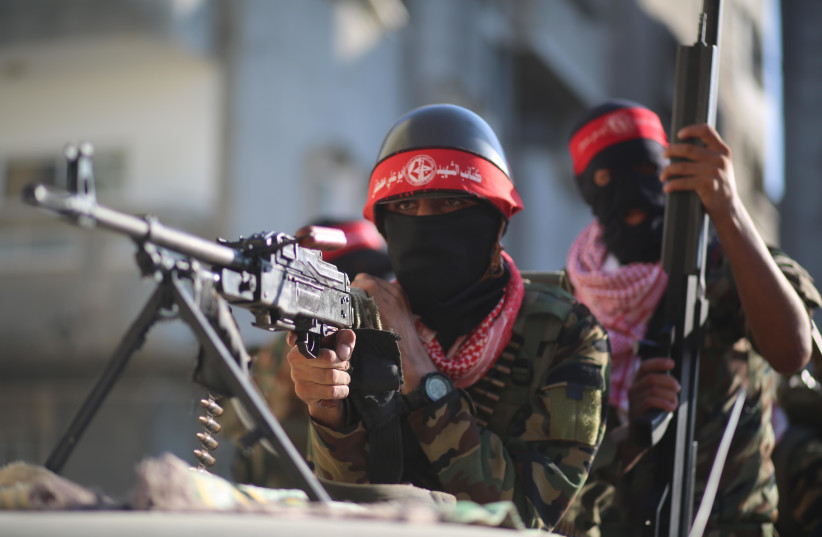One would expect that Israel’s designation of six Palestinian non-governmental organizations (NGOs) as terrorist groups in October 2021 would raise serious security and intelligence issues. But for their European funders, the designations are seen through a narrow political lens, reflecting longstanding close partnerships with Palestinian NGOs.
Since the designations, some European officials – particularly officials dealing with the Palestinian Authority – lobbied intensively for official statements in support of their NGOs allies. They succeeded last month: First, one of the designated groups, Al-Haq, claimed that the EU had lifted its suspension of funding (this claim has not been confirmed).
Then, on July 12, 2022, Belgium, Denmark, Spain, France, Germany, Ireland, Italy, the Netherlands, and Sweden published a joint statement asserting that Israel did not provide “substantial information… that would justify reviewing policies.” Finally, Norway, which had never stopped funding designated NGOs, issued its own statement of support.
At first glance, Europe’s refusal to act against the NGOs is difficult to explain. After all, Israel alleged that several senior members of the Popular Front for the Liberation of Palestine (PFLP) were using NGOs to obtain European funding for, and recruit members to, the terror group. At the very least, this demanded independent investigations (more on that in a moment).
More importantly, there is a wealth of extensive public information demonstrating the links between the designated NGOs and the PFLP. NGO Monitor research shows that over 70 individuals were found to occupy dual positions in NGOs and the PFLP over the last decade, and at least 11 officials from these terror-tied NGOs were arrested in the last two years. One piece of damning evidence stands out: NGO Monitor found a video that depicts a large group of officials from these NGOs attending a PFLP memorial event in Ramallah.

In fact, it turns out that at least one European government conducted and commissioned investigations – and confirmed that there were substantive links between one of the designated NGOs and terror! In July 2020, the Dutch government froze its funding for the Union of Agricultural Work Committees (UAWC) after an internal government investigation determined that Dutch funds were used to pay the salaries of two UAWC employees who were accused of being involved in the murder of an Israeli teenager, Rina Schnerb.
Second investigation
A second investigation, by an independent firm, concluded that 34 UAWC employees occupied dual positions both within the UAWC and the PFLP. Crucially, these latter findings were based solely on publicly accessible information, not classified intelligence.
SO, HOW can Europe – especially the Netherlands – pretend that there’s no reason to discontinue its support for the designated NGOs?
The first clue is the sheer scope of European funding for these NGOs. In the last decade, Europe has allocated more than €200 million for the PFLP-linked NGO network. Financial support is merely one component in a much more intricate and intimate relationship that European countries maintain with these NGOs. Although European funders justify funding policies on the basis of supporting human rights, civil justice, and peace, the reality is that political goals stand at the center.
Indeed, as opposed to maintaining a disinterested relationship, these NGOs play the role of intermediaries and subcontractors, providing important services to the funders. For instance, Europe’s NGO partners are crucial sources of information and influence, particularly regarding foreign policy issues. Selected organizations can serve as influencers in public policy discourse and generate political pressure on Israel – most particularly when it comes to the future of the West Bank, Gaza and more.
Europe’s willingness to overlook, and refusal to act on, Israel’s terror-designation of six Palestinian NGOs reflects this long history and the lack of independent oversight involving millions of euros. These so-called “civil society movements” serve as a means for European officials to perpetuate one-sided policies and attempt to gain more influence regarding Israeli-Palestinian issues.
At the same time, European governments have a responsibility to examine the actual results of their continued funding for terror-linked NGOs. In the face of clear evidence of the PFLP links, the illusions of “promoting democratic values” and creating “a free and strong civil society” among Palestinians is no longer sustainable.
Gerald M. Steinberg heads NGO Monitor and is an emeritus professor of political science at Bar-Ilan University. Liora Rosenblatt is editor at NGO Monitor.
